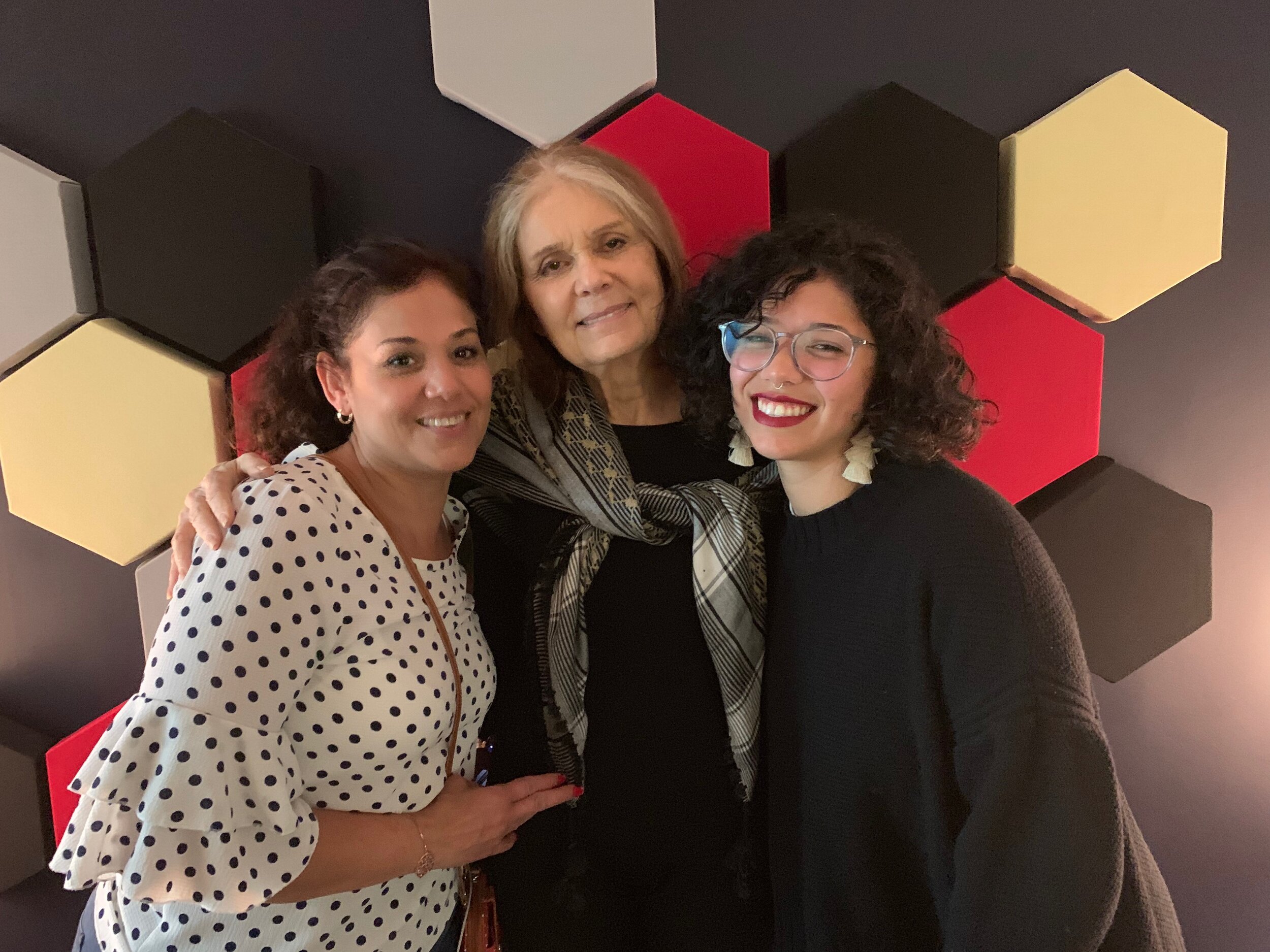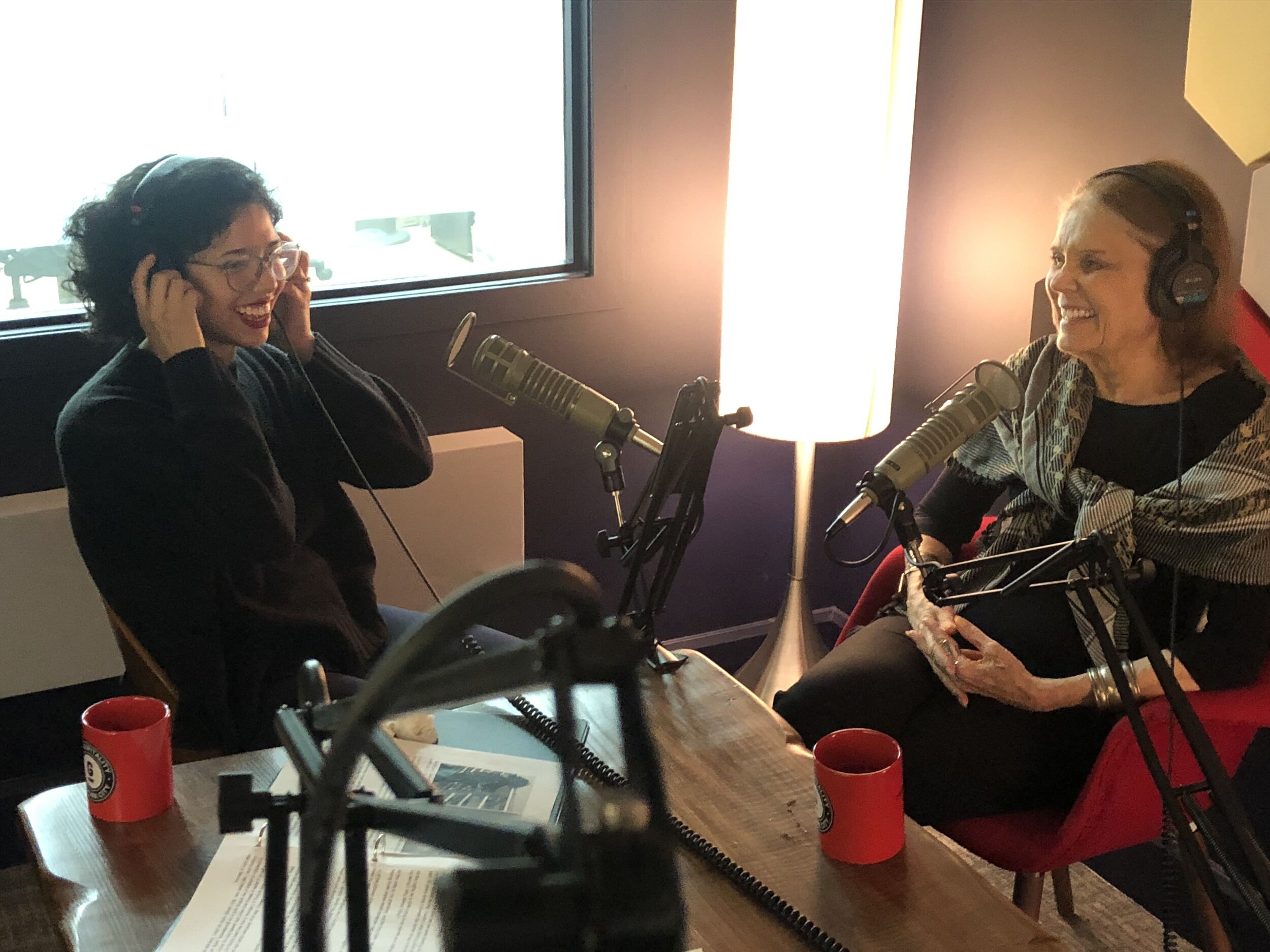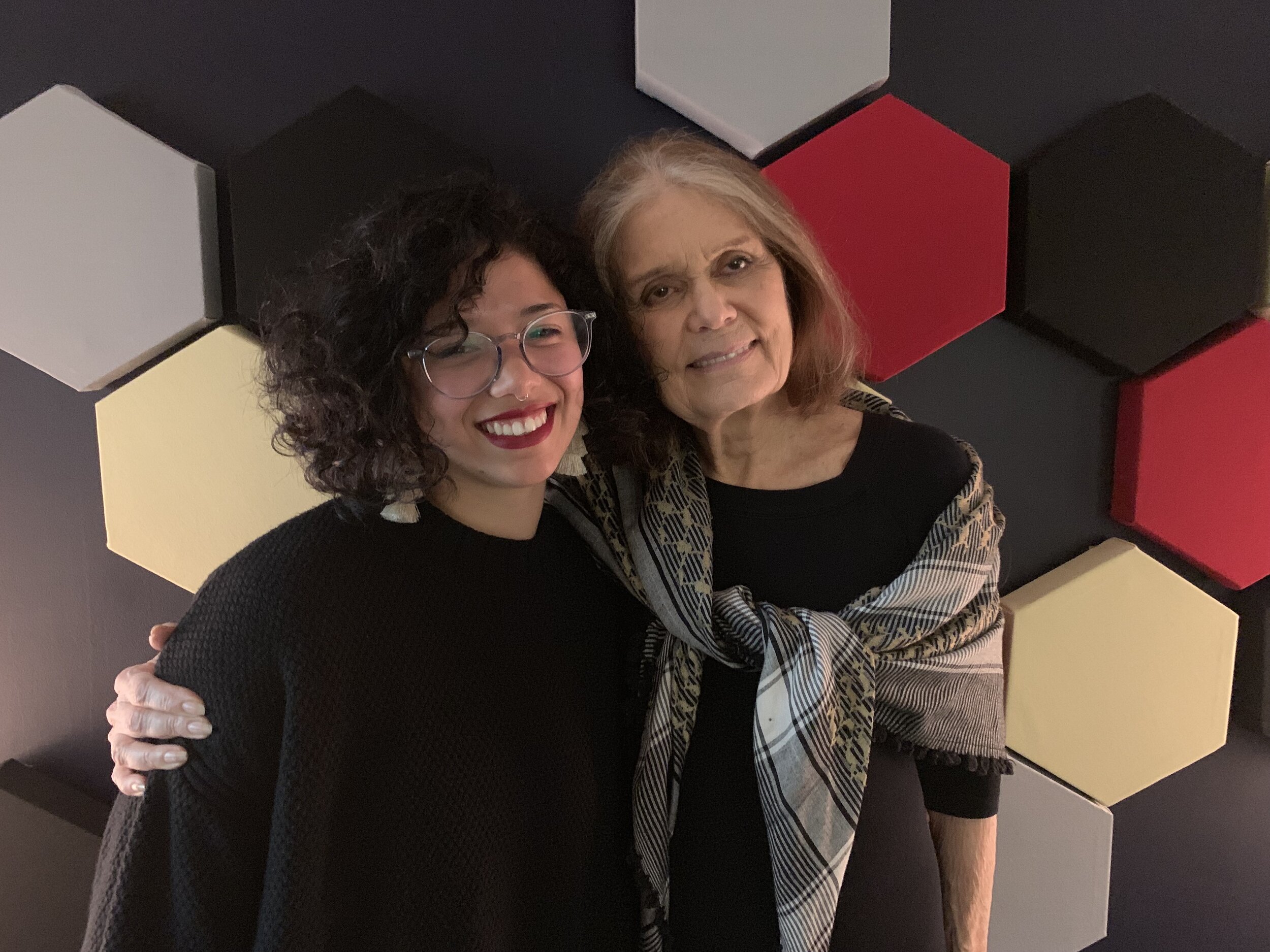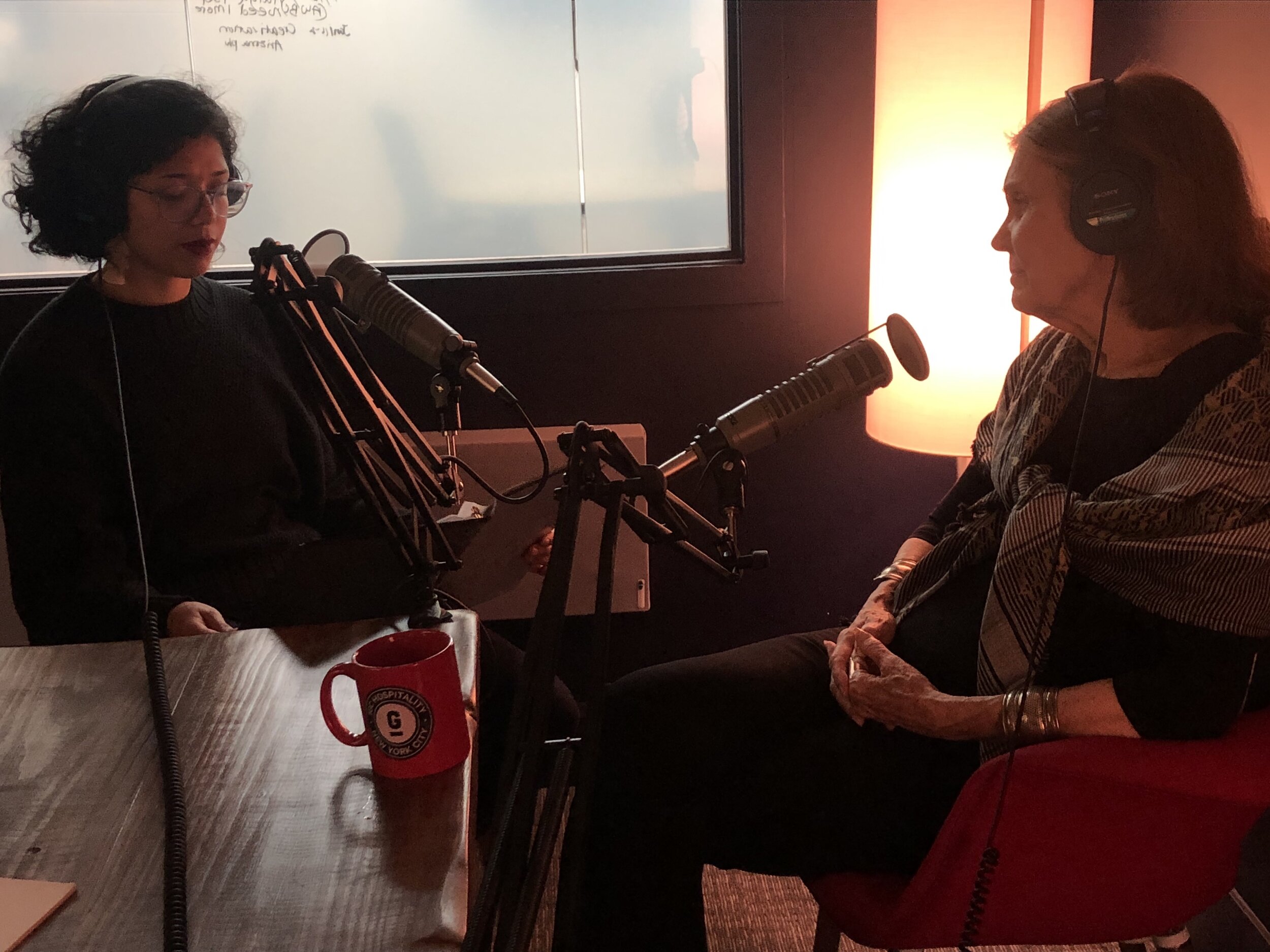Episode 2: Returning Home
Gloria Steinem reads the story of Kiara Chavez
Musical Guest Jennifer Berezan responds
Activist and writer, Gloria Steinem reads Kiara Chavez’s story about the obstacles immigration policy has placed between herself and who and what she loves. She tells a tender story of flying home to Mexico for the first time since she was age four to see her ailing grandmother.
Guests
Gloria Steneim
Gloria Steinem is a writer, lecturer, political activist, and feminist organizer. She travels in this and other countries as an organizer and lecturer and is a frequent media spokeswoman on issues of equality. She is particularly interested in the shared origins of sex and race caste systems, gender roles and child abuse as roots of violence, non-violent conflict resolution, the cultures of indigenous peoples, and organizing across boundaries for peace and justice.
Jennifer Berezan
Jennifer Berezan is a unique blend of singer/ songwriter, teacher, and activist. Over the course of ten albums, she has developed and explored recurring themes with a rare wisdom. Her lifelong involvement in environmental, women’s, and other justice movements as well as an interest in Buddhism and earth-based spirituality are at the heart of her writing. Her ground breaking work as a recording artist and teacher has established her as a leading voice in the field of music and healing and she is an acclaimed producer of large scale multi-cultural ecstatic musical events.
Kiara Chavez
Kiara Chavez is a graduate from CU Boulder’s Leeds School of Business with a Bachelor's Degree in Business Administration. Her experience as an immigrant has fueled her passion for social justice and she shares her story as a monologuist for Motus Theater's UndocuMonologues performance. In her role at KIPP, Kiara works with parent leaders, principals, and community members to connect the community with instrumental resources.
Full Episode Transcript
[AD]
Kirsten Wilson, Host (00:09):
From Motus Theater, welcome to the Shoebox Stories podcast, where we invite you to stand in someone else's shoes. I'm Motus's artistic director, Kirsten Wilson.
Kirsten (00:30):
For our first podcast series, UndocuAmerica, Motus asks a prominent American to stand in the shoes of an undocumented person by reading aloud their story, saying their words, and holding for a moment the weight that they carry. By reading the story handed to them in the studio, the reader is not saying they agree with everything written. They are simply agreeing to suspend judgment and feel the impact as they word-by-word experience the world through another's eyes.
Kirsten (01:10):
Our guest reader for this episode is legendary feminist activist and writer, Gloria Steinem.
Gloria Steinem (01:16):
Now, there's nothing on earth more supportive than people sitting in a circle, telling their stories, (laughs), telling the story you think only you feel. Three other people, say, "Oh, you feel like that? I thought only I," (laughs), "felt like that." Then we discover that it's some ways about power or injustice or something, and together we can change that.
Kirsten (01:38):
She will be reading the story of Kiara Chavez. A 22-year-old DACA recipient and recent college graduate, Kiara tells a tender story of flying home to Mexico for the first time since she was four years old to see her ailing grandmother. She was able to do this as part of the Advanced Parole program, that once allowed youth with DACA status to leave the country for work, education or, as in this case, a humanitarian reason. These visits are no longer allowed, because the Advanced Parole program was terminated in 2017.
Kirsten (02:12):
After the reading of the story and reflections we have a musical response selected by Gloria Steinem for Kiara's story. And now, Gloria Steinem, reading Kiara Chavez's autobiographical story, Returning to Myself.
Gloria (02:36):
The longest plane ride of my life was for my trip to Mexico when I was 19, so about two years ago now. I don't remember packing. I don't remember the drive to the airport. I don't even remember much about all the forms I had to fill out, or how much my family had to pay to apply for Advanced Parole, the program that used to allow DACA recipients to leave the country for study abroad, employment, or, as in my case, a humanitarian reason.
Gloria (03:06):
My grandma was having surgery, and she needed someone who could care for her as she recovered. I don't even remember much about the conversations with my worried parents about the dangers of me traveling. You see, although Advanced Parole granted me permission from the U.S. government to lawfully leave the country, it didn't actually guarantee I would be let back in. But spoiler alert, I made it back.
Gloria (03:40):
What I remember most is being on the plane, because I'll never forget how my heart beat faster the closer we got to taking off. The plane was going to Puerto Vallarta, and I'm actually from Colima, but they don't have a direct flight from Denver, and this is one of the closest airports. So you can imagine, I was surrounded by American tourists ready for vacation. Meanwhile, I sat there just about vibrating from nervousness or excitement. I'm not sure which. Either way, I just wanted to vomit. But luckily for the tourists on that flight, the knot growing in my throat kept holding it down.
Gloria (04:23):
Other people on the plane were chatting, making last-minute calls, getting out their reading material, and I was having a complete nervous breakdown. My hands sweating, my breathing fast, my whole body shaking. When I finally heard the pilot say we were heading out, and the plane began to move, my mind started racing. I couldn't stop thinking about what my life had consisted of the past 15 years, since I crossed the border at age four and left my first home.
Gloria (05:00):
All the nights as a child, crying in my parents' arms, asking, "Why can't I go back and see my family? Why, momma, why?" All the calls to my grandma, and the long kisses I would send them over the phone, hoping those kisses could somehow reach them all the way from Denver to Colima. All of the pictures to the beaches, my grandparents, my aunts and uncles, who I once knew so well, now getting older, photograph by photograph, having an entirely different life without me.
Gloria (05:34):
As a child I didn't understand why I couldn't go to Mexico, and still I trusted that it was something I simply couldn't do. But now somehow, at age 19, I was returning, and my heart was just about to burst.
Gloria (05:51):
I remember when the plane finally sped across the runway and lifted off into the air. I began crying with abandon, as if I was totally alone. Just me, launching into flight somehow, through both space and time. In my head I kept hearing my grandma's voices, the way they used to sooth me over the phone when I was little. "Mia, please don't cry. God willing, we will hold one another soon. Please don't cry anymore." Those phone calls were so painful, because I could hear them but I couldn't touch them. I couldn't hold them. I couldn't smell their hair.
Gloria (06:34):
My older sister could go to Mexico. She is an American citizen who was born in the U.S., when my father was working in California. Every few years during our childhood she would get on a plane to Mexico and return with sweets from my aunt's candy store, and a collection of photos of her smiling next to my grandparents, aunts and uncles, and the cousins who I had never met. But I simply could not return. That was the rule, because I was born in Mexico.
Gloria (07:08):
My sister could enroll in the best private schools in Denver and attend on scholarship. I was smart too, and tested in as well. But I couldn't go, because as an undocumented person, I wasn't eligible for financial aid, and there was no way my parents could afford the tuition.
Gloria (07:28):
My fellow classmates at the high school could fly to Europe, and study the art I loved and strived to imitate with my own brush. But I couldn't join them to see the frescoes and the ancient columns myself, because another DACA student had tried, and they did not let her back into the country. Instead, she and her whole family were deported.
Gloria (07:55):
I had spent my whole life reconciling myself to the solidity of barriers between me and my dreams, and the invisible borders between me and what I loved. But now, suddenly, I was flying over 500 miles an hour, strait through the biggest and most painful barrier of them all, between me and my family. I just kept thinking, is this real life? It can't be. Can I actually believe this is true, when so many of my dreams have been thwarted at the last minute? Is it really true that I'll be landing in Mexico and seeing my family? It can't be. But now for the first time, on that plane I could see it was actually coming true, and I was sobbing again like my four-year-old self, picturing my grandmas, thinking, I am making it to their arms, and they are still alive. We are alive.
Gloria (08:52):
Midway through the flight, still shaking, I began to become aware again that there were others still on the plane. I managed to wipe my tears and smile, finally excited. I laughed at myself, thinking, wow, they must think I'm crazy, or that I'm really scared of flying. But how could they ever understand the magnitude of this moment in my life? I'm fulfilling the American immigrants dream, my dream. I'm seeing my family after 15 years, and I wanted to yell it across the aisles and tell the whole plane what a triumphant day they were a part of.
Gloria (09:29):
It's real, it's real. I'm returning to see my family, to meet my family, the lineage of people whose love and existence have filled my veins with blood, and my belly with culture. I'm going to step my feet on the dirt I was molded from, and breathe the humid air my lungs were meant to breathe. I'm fulfilling the prophecy my mom commenced when she threw my umbilical cord on top of the house, that my father and my grandfather built, because she believed it would one day bring me back home. I, Kiara Jocelyn Chavez Garcia am returning home. I am returning to myself.
Gloria (10:13):
On that long ride back to Colima, for those hours of anticipation my dreams were finally in my own hands, and I could touch them, feel them, smell them. The years of pain and rejection hardly mattered as I approached the millions of kisses I had sent that way.
Kirsten (10:38):
Beautiful. Thank you. Gloria, would you tell Kiara what you experienced reading her story?
Gloria (10:45):
I think the feeling of going through an invisible boundary. Not only nations make up boundaries. We make up boundaries, (laughs), in our heads. And the feeling that there was a separation of kind of physical or air mass or cloud, or some kind of impenetrable separation between Mexico and the United States feels very real, and it's kind of like a huge version of putting your s-, foot down for a stair when there's no stair, (laughs), you know, and suddenly discover one minute there- there is no stair. You can just walk.
Kirsten (11:29):
Gloria, are there any questions you would like to ask Kiara to make sure that you fully understood her story?
Gloria (11:34):
What would you want to communicate to me, if that's not too big a question?
Kiara Chavez (11:41):
I think from this story, it's very ingrained in my culture, and what I've learned from being Latin American, or just Mexican, which is family. So I think this is especially hard for me, and why you can hear in my voice, is that since I've grown up I've known that family is everything, and we look up to our elders. And it's more respectful to give all my attention and love, and everything to my elders especially. And so to have been robbed of my grandparents I think is the biggest injustice in my life. I think it's why I landed on this story. Sorry.
Kiara (12:33):
Because it's been painful to grow up without their knowledge and that relationship, and even to grow alongside Americans who don't value their grandparents as much, and growing up with friends who have told me about how close they live to their grandparents, and they don't see them, and they don't visit them, and they don't care to talk to them and have that knowledge passed down, has always been a huge betrayal to me that I've always tried to communicate to those friends, how privileged they are to have that relationship so near, and how dear that is to care for. I think that's where most of my emotion comes from, is that relationship that I don't get to experience.
Gloria (13:29):
You know, that's interesting, and I'm trying to think empathetically myself how I experienced that, and my own family is more a chosen family than a birth family. That's probably because I wasn't kept from my birth family. I mean, I- I didn't have to fight.
Gloria (13:53):
I knew that relationship was there. In my case, my mother, no one kept me from my mother. I was always able to see her and be with her. But she was kept from having her own life. She was a journalist before I was born, and then had to give that up, and never had her own life after that. So I always felt that I was living out her unlived life. What it evokes for me is something different, or not so different, but just the- the waste of dreams and intelligence and emotion locked in people because of gender, or because of race or language, or ethnicity, whatever crazy reason. You know, in my mother's case it was because she couldn't continue that life as a female human being.
Gloria (14:52):
So maybe what we're both feeling is what might have been. I'm feeling who my mother could've been, and you're feeling what your relationships with the relatives you loved could've been. And that sense of loss and wonder is very difficult, but I think we have to stick with it and pursue it and feel it, and try to see where it takes us. Because for one thing, it can help us understand other people who are going through this. And you have a great understanding of people who are unable to move freely, so, or deprived of their family and their cultures, and so on, and you can be such an important messenger and comfort to people who are in the same situation. I... You know, there's nothing on Earth more supportive than people sitting in a circle telling their stories, (laughs), telling the story you think only you feel. Three other people say, "Oh, you feel like that? I thought only I felt like that."
Gloria (15:56):
Then we discover that it's some ways about power or injustice or something, and together we can change that. There's nothing, nothing more positive and exciting and forward-moving than that kind of sharing of stories.
Kiara (16:12):
I've definitely been transformed by being able to sit in circle and relate to other people, and feel like it wasn't just me, and it isn't a lonely world, and we have the power of all of us, in- in order to make a change.
Gloria (16:32):
And once, you know... I've... I'm... I mean, I'm not a historian, much less an archeologist, but California and Mexico, it was all one country, and there- there wasn't a border.
Kiara (16:45):
Yeah, I do remember that growing up I just always thought there was a border and there was a wall, and I watched a movie with my family called Mi Familia, and they just walk across the border. And family friends are like, "Yeah, that's how it used to be." And to me it was the wildest thing to imagine. Like, really? You could just walk across like that? And now as an adult it's like, yeah, uh, it should be like that. It is like [inaudible 00:17:15] said, we're all just human beings on the planet Earth, a huge rock in the universe. So why can't we travel around?
Gloria (17:22):
Yeah, the- the boundaries, the fences and names and all of that are sort of the same as gender and race and class, and whatever other kind of categories we're- we're su- supposed to be in.
Gloria (17:37):
Instead of both the unique specific, which we are, nobody else in the world ever could be like you or like me. And the shared human that we are, right?
Kirsten (17:52):
Gloria, before you read Kiara's story she read her own story directly to you. What impacted you when Kiara read her story?
Gloria (18:00):
Well, Kiara, listening to you, the most impactful part is your voice, because I hear and feel the emotion, and that informs and makes me feel all the words, and I just wanna hug you, (laughs), and- and somehow dissolve the walls between here and home, because we're all here on spaceship Earth. We should be able to travel wherever we want.
Gloria (18:36):
My heart goes out to your story, and I was trying to imagine, what would a similar story be for me? And you know, I think that's the- the purpose of empathy. I mean, human beings couldn't have survived without empathy, and it's a great gift that you can do that with words and with your story, and help us feel connected and bonded. Somebody else could've read [inaudible 00:19:06] you were reading, and- and I- I- I wouldn't have had the gift of the same emotion.
Kirsten (19:14):
I should let our listeners know that there are two companion podcasts in the UndocuAmerica series. So not only can you hear the impact on Gloria Steinem of reading Kiara's words on this Shoebox Stories podcast. You can hear Kiara telling her story to Gloria on the Motus Monologues UndocuAmerica series.
Kirsten (19:33):
And now Kiara, how about you? What was it like having Gloria Steinem read your story? What was most impactful?
Kiara (19:42):
That Gloria Steinem's, (laughs), reading my story. I guess just hearing it back, it was a very different experience. I hadn't heard somebody read it back. Instead of the sadness that I get, I felt more of my anger and frustration, like my teenage angst of why, and this isn't fair, and I heard that a lot in my story, and I was feeling that again.
Kirsten (20:16):
Is there any last thing you would want to say, one to the other, before we end today?
Kiara (20:22):
I wanna thank you for your wisdom. It meant a lot to me to hear you say that I can be an advocate for people who have felt this displacement. I was sitting with your reflection about how these barriers are similar to the barriers we put with gender and class and race. And I like this moment, because it was so genuinely real on how it shouldn't be that much trouble for me to, as a Mexican-born person, go back to my home, and then go back to my home in Colorado, without needing a U.S. passport to back it up, or without having to have paid for an application that allowed me to do it, and how opening our minds, similar to how people have opened their minds to other movements, it could really impact a lot of people, and make a change in the way we think, especially in the way we see ourselves in the world, the way we can understand different cultures, languages, and how those could definitely be assets in uniting people, and in progressing people, even more than... We've made the strides already.
Gloria (21:50):
Let's see. I think I just wanna declare that you and I, and everyone here, (laughs), and everyone-
Gloria (22:02):
... are passengers on spaceship Earth, and there are no national boundaries, and we share our- our humanity and our aliveness with all living things, flowers, animals-
Gloria (22:21):
... everything on this spaceship, and I think the more that we can visualize ourselves that way and talk to each other that way, the more we can undermine the boundaries that are completely made up, totally made up. Just, they don't exist. I'm so glad to be in this room with you, where no boundaries exist. (laughs).
Gloria (22:46):
Be fun to see how our lives maybe change a little bit, because we've been in this room together. Because for a moment in time we've been in the same space on spaceship Earth. Exciting, right?
Kiara (23:00):
Very exciting. (laughs).
Gloria (23:00):
And so we'll go on into the rest of our voyage a little bit different and better than we would've been.
Kiara (23:08):
Thank you so much.
Gloria (23:08):
Thank you.
Kirsten (23:11):
Gloria Steinem's selection for Kiara's story, the song Returning, by Jennifer Berezan.
[Returning - by Jennifer Berezan]
Kirsten (24:38):
That was the song Returning, by Jennifer Berezan with chanting by Yemaya. A very special selection by Gloria Steinem in honor of Kiara Chavez's story. You can watch a video of Kiara reading her own story on our webpage, shoeboxstories.org, or hear her read it to Gloria Steinem on our companion podcast, Motus Monologues UndocuAmerica series. We hope you will share Kiara's story with your friends and family, so everyone knows the people whose lives are at stake in U.S. immigration policy.
Kirsten (25:13):
Next month on the Shoebox Stories Podcast UndocuAmerica series, Pulitzer Prize-winning op-ed writer for The New York Times, Nicholas Kristof, reads the story of Reydesel Salvidrez-Rodríguez.
Nicholas (25:23):
And I, an undocumented, legally deaf, first generation college student, I win.
Kirsten (25:34):
Thank you to Gloria Steinem, Kiara Chavez, Jennifer Berezan, and all of you listening who are willing to stand in the shoes of someone with a different experience than your own and see the world, for a moment, through their eyes. Please take good care of yourselves, those you hold dear, and your neighbors, both those near and far.
We are so grateful for The Shoebox Stories creative team, including: Carlos Heredia, theme song, Alejandro Fuentes Mena, vocals, Robert Johnson, vocals, Anthony Salvo, violin underscore. And the podcast creative team. Artistic Director Kirsten Wilson, Editor Sam Glover, and Matthew Simonson. The Motus Theater production team, Rita Valente-Quinn, Michelle Maughan, and Kiara Chavez. And the entire Undocu Monologue group. Laura Peniche, Victor Galvan, Tania Chairez, Reydesel Salvidrez-Rodríguez, Kiara Chavez, Juan Juarez, Irving Reza, Cristian Solano-Córdova, Armando Peniche, and Alejandro Fuentes Mena.






